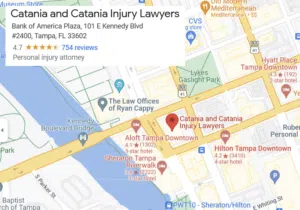
In the legal world, the term ‘breach’ describes a failure to perform. If someone breaches a contract, they have failed to live up to their end of the agreement.
If someone breaches a duty to care they owe someone else, they could injure that person. In fact, they might have a negligence claim for their injury.
If you have legal questions, make sure you direct them to an experienced attorney.
Table of Contents
What is a Duty of Care?
A duty of care is a legal responsibility that one person owes another. This duty is usually imposed by law because of someone’s profession, activity, or relationship with others. For example, doctors and accountants have several professional duties of care towards their patients stemming from state licensing boards and law.
Similarly, all drivers have a duty of care towards all others on the road. This duty of care includes obeying all traffic laws and driving safely. Accordingly, a driver breaches their duty by violating traffic laws and/or driving carelessly. If this conduct hurts someone, the driver could be liable for the injury victim’s damages.
Examples of a Breach of Duty
The first step in any negligence case is proving that a duty of care exists. Once that is proven, then the next step is to prove that another party breached their duty of care.
Some common breaches include:
- A driver who is speeding, texting while driving, and driving under the influence
- A property owner who fails to fix dangerous conditions on their property
- A doctor who provides substandard care and injures a patient
These are just some examples of a breach of duty. It is important to speak to an attorney to assess if another party breached their duty to you.
How a Breach of Duty Occurs in a Negligence Case
If you were injured due to another’s conduct, you may be eligible to file a negligence claim. Negligence claims often are filed after car accidents, slip and falls, or medical malpractice.
You will need to prove the following elements to win your negligence claim:
- Another party owed you a legal duty of care (as discussed above)
- They breached their duty
- The breach caused you harm, and
- You suffered damages
To prove another party breached their duty of care, you must show they failed to act like a reasonable person and injured you. The reasonable person is a standard of behavior juries use to determine if someone was negligent.
A reasonable person is not a real person; it is a hypothetical person who acts with common sense and prudent judgment to avoid injuring others. A jury will compare a defendant’s conduct to that of a reasonable person’s under similar circumstances. If the jury finds the defendant acted unreasonably, they may determine the defendant breached their duty.
For example, suppose a driver runs through a red light and causes your car accident. A reasonable person obeys traffic laws and signals; they would not run red lights because such behavior could result in a collision. Therefore, a jury might find the driver breached their duty of care to drive safely and avoid injuring you.
Breach is just one element. If you are not able to prove all of the elements of negligence, your claim will be unsuccessful. Moreover, if you were partially to blame for the accident, your recovery can be limited or prevented by law.
How a Breach of Duty Occurs in a Strict Liability Case
There are some situations where you can hold someone responsible for harm without proving negligence. This is known as strict liability.
Under strict liability, a defendant is liable for engaging in certain conduct, regardless of the precautions they took or whether they intended harm.
Some examples of strict liability include:
- Abnormally dangerous activities: This is an activity that creates a foreseeable risk of serious harm even when reasonable care is exercised. The activity is also not something that is commonly done. Any work done with explosives or nuclear power, etc. can be considered an abnormally dangerous activity.
- Product liability: Manufacturers of products are held strictly liable for products that have design, manufacturing, or marketing defects that cause harm.
- Wild animal ownership: Anyone who is a wild pet owner will be held strictly liable if their pet harms anyone.
- Dog Bites: A dog owner can be held strictly liable when their dog bites another person and causes injuries.
Only specific situations can lead to strict liability. Understanding what kind of claim you may have is the first step towards a financial recovery.
Contact a Tampa Personal Injury Attorney for Help
Negligence is complicated. If you were injured by another’s carelessness, you should contact a personal injury attorney at Catania and Catania Injury Lawyers for help. Call at (813) 222-8656 or contact our law firm in Tampa, FL, today. Our personal injury lawyers in Tampa will explain your options for recovering compensation from the at-fault party.




